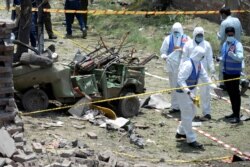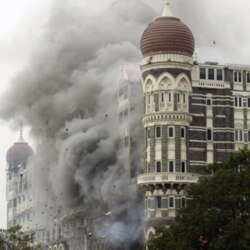At least three people have been killed and more than ten others injured in an explosion in Lahore, Pakistan, outside the house of Hafiz Mohammad Saeed, a man linked to the 2008 attacks in the Indian city Mumbai that killed more than 170 people.
Saeed is the leader of Jamaat-ud-Dawa, or JuD, an Islamist militant group operating in South Asia. It was not immediately clear if Saeed was among the casualties.
The explosion was powerful enough to damage nearby houses and several vehicles standing in nearby streets, witnesses said.
According to VOA’s Urdu language service, police, members of a paramilitary force called the Rangers, the counterterrorism force, as well as Saeed’s personal security guards surrounded the house soon after the explosion.
Eyewitnesses and journalists were told to move away and cell phone signals were jammed in the surroundings.
Ghulam Mehmood Dogar, the head of police in Lahore said so far nothing could be said about the nature of the blast.
“It could be a gas blast, it could be something else, but somebody has to make a final determination as an expert,” he said.
Saeed is on both the United States and the United Nations lists of sanctioned individuals. He has been designated a terrorist by the U.S. Justice Department.
“Hafiz Muhammad Saeed is the leader and chief of Lashkar-e-Tayyiba (LeT),” the U.N. statement said. “As overall leader, Saeed played a key role in LeT’s operational and fundraising activities. He is the Amir or leader of the Jamaat-ud-Dawa (listed as an alias of LeT).”
LeT is the group blamed for the Mumbai attacks. Pakistan’s neighbor India has long sought action against Saeed for his involvement in the attacks, but Pakistani courts have often given him relief citing lack of evidence.
Last year, Pakistani courts convicted Saeed in several cases linked to terrorism financing. He was serving a sentence of five and a half years.
The U.S. has offered a bounty of $10 million to anyone providing information that leads to Saeed’s conviction in the Mumbai attacks case.










